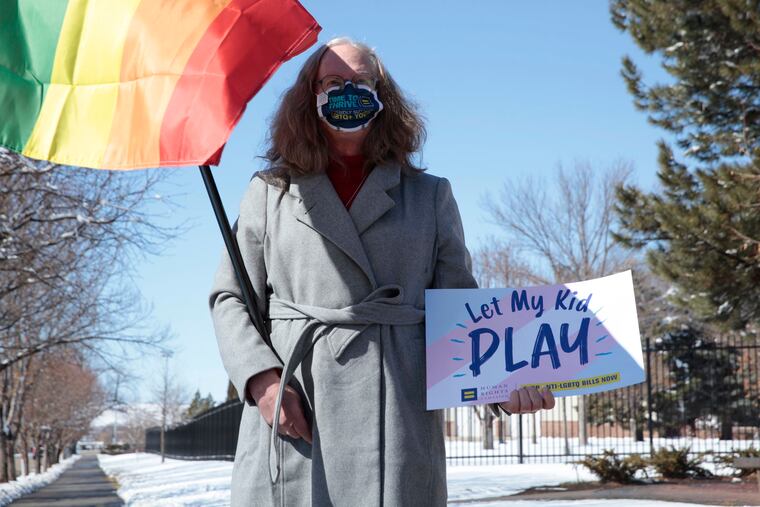Transphobic sports ban attempts to solve a problem that doesn’t exist | Opinion
Rooted in fear and misinformation, this bill would only cause mental and emotional harm to trans athletes.

A small group of conservative lawmakers introduced a bill last week that would ban transgender students in Pennsylvania from playing school sports, joining the nationwide assault on trans rights. Called the Fairness in Women’s Sports Act, the bill would prohibit trans girls in high school and college from competing on girls and women’s sports teams.
Although the bill is being touted as a way to “protect” women’s sports, it seeks to solve a problem that does not exist. There is no evidence that trans girls, in Pennsylvania and elsewhere, are “hijacking” or “dominating” girls and women’s sports. Trans students have been competing on school sports teams in accordance with their gender identity for years, and there has yet to be a major controversy. In fact, a recent report from the Associated Press found that lawmakers who have introduced similar bills in more than 20 states have been unable to cite a single example in which a trans student’s participation in girls or women’s sports has caused a problem. This is also the case here in Pennsylvania, one of the few states in the country that currently has no state guidance on trans students’ participation in school sports. The Pennsylvania Interscholastic Athletic Association allows individual principals to decide a school’s policy.
Despite the baseless fear-mongering sweeping the state and the nation, there is no real issue at play here. Trans girls are not taking over women’s sports, nor do they pose a threat to cisgender girls and women. While proponents of the bill may argue that trans girls have an inherent athletic advantage over cis girls, this is a gross overgeneralization and a false one at that. Chromosomes are not a useful indicator of athletic performance, and there is no evidence that trans girls and women outperform cis girls and women, according to a scientific review published in the journal Sports Medicine. Both cis and trans athletes vary in athletic ability, and cis athletes often outperform and outcompete trans athletes. Not to mention, the National Collegiate Athletic Association already has guidelines in place that require trans women athletes to undergo at least one year of hormone replacement therapy before they can even compete on women’s teams.
» READ MORE: Group of GOP lawmakers seek to ban Pa.’s transgender student athletes from playing women’s sports
The Fairness in Women’s Sports Act would do nothing to “protect” cis athletes because trans students are not a threat. Trans-inclusive sports policies have no negative impact on cis students, according to a report from the Center for American Progress. In fact, such policies may even increase overall participation in girls sports. More importantly, trans-inclusive policies greatly benefit trans students by increasing acceptance and feelings of safety and improving grades and self-esteem. Conversely, trans sports bans would almost certainly hurt trans students, who are already less likely to play sports than their cis counterparts in the first place. Not allowing trans students to compete on sports teams in accordance with their gender identity could cause substantial harm to their mental health and well-being. Trans kids are already more likely to be bullied, harassed, and rejected by friends and family members and face much higher rates of suicide and depression than their cis peers. Trans-exclusive policies would only exacerbate this disparity.
None of this is taken into consideration, however, when lawmakers are crafting bills like the Fairness in Women’s Sports Act because the point is not to actually protect anyone — it’s to make sure that trans students feel unwelcome and invalidated.
Laws that exclude and punish trans students only further ostracize them from their peers and reinforce false and outdated gender stereotypes, serving as yet another way for lawmakers to police women’s bodies, trans and cis alike. Rooted in fear and misinformation, this bill would only cause mental and emotional harm to trans student-athletes and would almost certainly be later used to justify further discrimination against an already vulnerable population. School sports benefit all students and play a normal and healthy role in a young person’s socialization. Excluding trans girls from experiencing this sends a clear message that trans people don’t belong, which could not be further from the truth. Trans people belong in all aspects of public life, including sports, and deserve basic decency, inclusion, and respect, and the overwhelming majority of Pennsylvanians agree.
The Fairness in Women’s Sports Act is a solution in search of a problem. Women’s sports and cis athletes don’t need protection because trans people are not a threat. The only threat here is exclusion and transphobia.
Catherine Caruso is a Pennsylvania-based freelance writer with a focus on culture, politics, and LGBTQ rights.